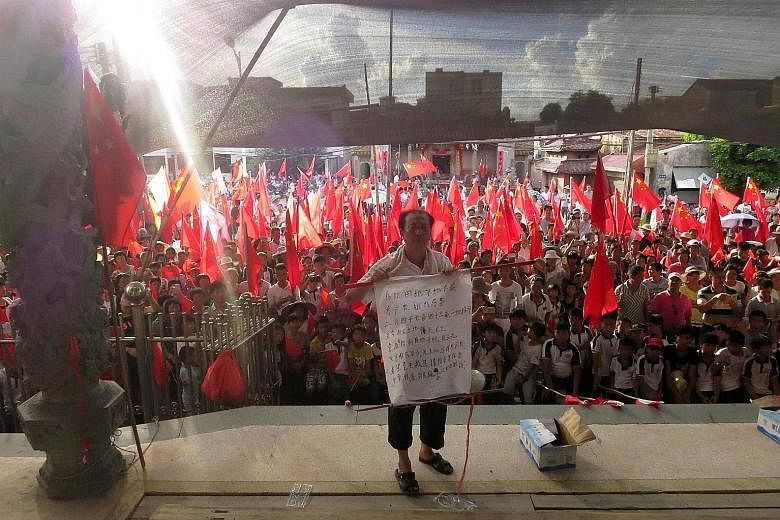WUKAN • Hopes for democracy in the Chinese village of Wukan, where an uprising against corruption five years ago gained global notice and led to direct village-wide elections, have all but evaporated, with protest leaders either in detention, in exile, facing arrest or quitting their posts.
Villagers have been marching in protest every day since the middle of June in a fresh flare-up of unrest triggered by the arrest of elected leader Lin Zuluan for bribery after he urged demonstrations against new land grabs and graft.
"The corrupt are very proficient in deceiving the people," the 72-year-old Lin wrote in a signed letter to the village dated March 2, adding that the seized land had been "raped by power, money and gangsters".
In 2011, villagers ransacked the Wukan police station and government offices before barricading themselves against riot police.
Lin's arrest was the latest move against the core group of Wukan protest leaders from 2011. In 2014, two former deputy village chiefs, Yang Semao and Hong Ruichao, were jailed for two and four years respectively for bribery, around the time of another village election.
Another leader, Mr Zhuang Liehong, fled China and sought asylum in the United States, fearing for his safety amid what he told Reuters was "political persecution". Two others quit, while Mr Sun Wenliang, a former accountant, has an arrest warrant on his head, village sources said.
In December, Lin wrote several letters to a developer, Hua Hui Real Estate, that he said had acquired a 110,000 sq m plot in Wukan without his knowledge or the approval of the Wukan village committee that oversees land use. Lin is the committee head.
The committee had demanded the company give evidence of the land deal and provide a detailed survey map of the Long Hu Bay area it planned to develop.
The company replied to the committee three days later that it had acted "in accordance with law and procedures", but declined to provide any documents, directing further inquiries to the "relevant government departments".
The Lufeng government that oversees Wukan said in a written reply to Reuters that Long Hu Bay was "state-owned land which does not belong to the villagers" and that Hua Hui had now halted construction, given Wukan's objections.
A few days after his call for new protests, on June 18, Lin was arrested by Swat officers who stormed his walled compound after midnight and bundled him away, his wife told Reuters. A confession by Lin admitting to taking large bribes was aired on state television on June 21.
Lin remains in police custody and investigations continue into allegations that he took bribes of up to 600,000 yuan (S$122,000) for land deals and public works projects, according to the official China Daily newspaper.
REUTERS

